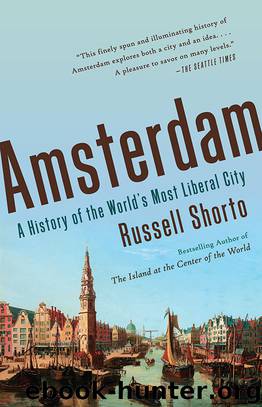Amsterdam by Russell Shorto

Author:Russell Shorto [Shorto, Russell]
Language: eng
Format: epub, mobi
ISBN: 978-0-385-53458-1
Publisher: Knopf Doubleday Publishing Group
Published: 2013-10-21T16:00:00+00:00
Marvell singled out Amsterdam and its population of mixed races and religions and ideas for particular derision:
Sure when Religion did it self imbark,
And from the east would Westward steer its Ark,
It struck, and splitting on this unknown ground,
Each one thence pillag’d the first piece he found:
Hence Amsterdam, Turk-Christian-Pagan-Jew,
Staple of Sects and Mint of Schisme grew;
That Bank of Conscience, where not one so strange
Opinion but finds Credit, and Exchange.
The redoubling of trade translated as well into cultural advances. We can bundle these advances into one set of statistics. All the arenas of life that burgeoned in the period—physics, medicine, politics, art, industry, finance—reduce, ultimately, to books, for new achievements in every field were eventually transmitted through print. The number of bookshops in Amsterdam at this time has been estimated at a staggering four hundred, and at one point the city had roughly a hundred publishers. One of the most remarkable statistics I have ever encountered is the estimate by H. de la Fontaine Verwey (who then held the chair in “the science of the book” at the University of Amsterdam) that in the seventeenth century one-half of all books published in the entire world were published in the Dutch provinces. Factoring in another estimate would mean that about 30 percent of the world’s published books in the seventeenth century came out of Amsterdam.
De Witt’s opposition, meanwhile, was down but not out. It consisted of two factions: the Orangists, who believed (as did nearly all Europeans) that a country needed a monarch as its leader and figurehead, and the orthodox Calvinists, who believed (as did nearly all Europeans) that a country’s government needed a biblical foundation. The Orangists got a boost from England in 1660 when, following Oliver Cromwell’s death, Charles II (who had been sheltered for a time by the House of Orange in The Hague) was restored to the throne of England. Orangists were now able to turn back republican arguments that there was a movement toward democracy sweeping Europe and to claim instead that the flawed English experiment of government without a monarch had come to its inevitable end. Propagandists staged a play about William the Silent to remind everyone that the House of Orange had led the way in the war against Spain.
De Witt was undeterred. A second trade war erupted with England, and under De Witt’s order Michiel de Ruyter, the great Dutch admiral, sailed up the Thames, into the Medway, and destroyed the heart of the English navy, in what has been called the worst defeat in English naval history. The attack brought a quick end to the war at terms that were favorable to the Dutch.
It was in this moment of world-historic growth, and amid consistent attacks from the Orangist/Calvinist party against the Dutch republicans, that Spinoza put aside the great, deep, and arcane work of philosophy he was embarked on (his Ethics) in order to write a frankly political book. His decision to title it Tractatus Theologico-Politicus somewhat obscures the fact that he intended it for a broad audience.
Download
This site does not store any files on its server. We only index and link to content provided by other sites. Please contact the content providers to delete copyright contents if any and email us, we'll remove relevant links or contents immediately.
| Africa | Americas |
| Arctic & Antarctica | Asia |
| Australia & Oceania | Europe |
| Middle East | Russia |
| United States | World |
| Ancient Civilizations | Military |
| Historical Study & Educational Resources |
Room 212 by Kate Stewart(5095)
The Crown by Robert Lacey(4794)
Endurance: Shackleton's Incredible Voyage by Alfred Lansing(4747)
The Iron Duke by The Iron Duke(4341)
The Rape of Nanking by Iris Chang(4193)
Joan of Arc by Mary Gordon(4085)
Killing England by Bill O'Reilly(3988)
Say Nothing by Patrick Radden Keefe(3970)
I'll Give You the Sun by Jandy Nelson(3423)
Shadow of Night by Deborah Harkness(3346)
Hitler's Monsters by Eric Kurlander(3323)
Mary, Queen of Scots, and the Murder of Lord Darnley by Alison Weir(3194)
Blood and Sand by Alex Von Tunzelmann(3183)
Eleanor & Park by Rainbow Rowell(3144)
Darkest Hour by Anthony McCarten(3114)
Margaret Thatcher: The Autobiography by Thatcher Margaret(3070)
Book of Life by Deborah Harkness(2915)
Red Famine: Stalin's War on Ukraine by Anne Applebaum(2913)
The One Memory of Flora Banks by Emily Barr(2851)
